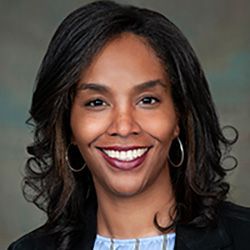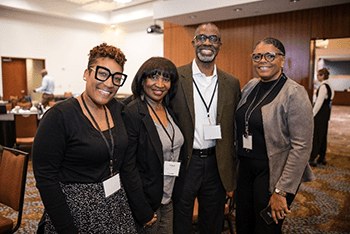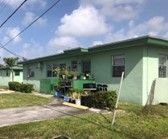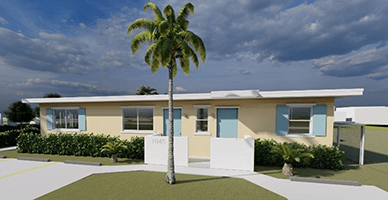Small to Medium Multifamily (SMMF) properties are a critical source of affordable housing for low- and moderate-income households. Across the country, there are an estimated 23 million rental units in SMMF buildings, 80% of which are affordable to households at or below 80% area median income. In Fulton County, GA, and Miami-Dade County, FL, alone, SMMF properties make up nearly 143,000 rental homes. Through Preservation Next, Enterprise is committed to preserving the affordability of SMMF properties and ensuring they are safe, healthy, and resilient places to live now and into the future.
In the Southeast, Enterprise launched its third Preservation Academy, a series of no-cost trainings and peer learning sessions designed to build the capacity of developers and housing providers to acquire, rehabilitate, and preserve affordable, unsubsidized SMMF rental properties. In addition to the public Academy sessions, 10 organizations were selected to be a part of an intensive Southeast Preservation Academy cohort. These affordable housing development organizations, 6 of whom are BIPOC-owned or led, were selected to receive additional training, catalytic grants, and technical assistance from Enterprise and our partners.
|
Image

|
“For those of us new to the space, the Preservation Academy has been very helpful to understanding what we need to proceed. The Drake House has two SMMF properties that house single mothers and their children to overcome homelessness, and we want to protect the properties we have and seize opportunities to develop more.” Nesha Mason, President, The Drake House (2023-24 Southeast Preservation Academy cohort member) |
Compared to Enterprise’s prior Preservation Academy cohorts in California and Colorado, the Southeast cohort took on a distinct flair relevant to our region’s pressing housing issues, contexts, and imperatives. The Southeast Preservation Academy cohort featured a specific emphasis on permanent supportive housing and community ownership. Two of the cohort members are community land trusts, while three cohort members serve target populations including those who are formerly unhoused, survivors of domestic violence, and/or living with HIV or AIDS. The Southeast iteration of the Academy was also the first to pilot a support track for individual or “small” owners of multifamily properties, modeled after Enterprise’s support of the Local Rental Owner Collaborative (LROC) initiative in South Los Angeles.
Connecting Emerging Developers with Financing and Networking Opportunities
In March, we held our first in-person event for cohort members as well as developers and housing providers working in Metro Atlanta and South Florida. The day-long convening, Financing Small to Medium Multifamily Preservation Deals, focused on leveraging Enterprise’s network in the Southeast to expand opportunities for emerging developers to hear from and network directly with the funders they need to move their projects forward.
In opening remarks from Preservation Next sponsor Kaiser Permanente, Stefanie Hurst, Senior Director of Community Health shared, “An investment in affordable housing means better health, education, and economic opportunity for all residents. Simply put, we can do much better together.”

In the first panel, funders from public sector agencies in Atlanta and a major nonprofit in Florida shared the numerous government resources available for small to medium multifamily preservation deals. This panel was followed by a conversation with CDFI and philanthropic organizations, about how private funds can be another crucial source layered into a capital stack. In both morning sessions, attendees were able to ask direct questions of panelists in the group setting, and many attendees shared their interest and excitement about particular funding opportunities. The session then segued into a networking lunch that provided more direct opportunities for connections between attendees, panelists, and Enterprise staff.
The last panel of the day featured concrete examples of SMMF preservation happening in the Southeast. Following the networking lunch, the third panel of the day featured three Southeast developers with innovative models for funding resident services, permanent supportive housing, and/or neighborhood-specific projects. Attendees were able to enjoy a quick round of case studies from these model developers, before speaking with these panelists 1:1 in the “open house” resource tables activity at the very end of the session.
View the full event presentation for information from Georgia Department of Community Affairs, Invest Atlanta, Atlanta Housing, Florida Housing Coalition, Low Income Investment Fund, Atlanta Neighborhood Development Partnership, Enterprise Community Investment, Community Foundation for Greater Atlanta, Star-C, Westside Future Fund, and Partners for Home.
Aligning Work to Mission
Now that cohort members and Preservation Academy participants have completed trainings on everything from defining opportunity to financing projects, the final sessions will focus on the hands-on work of tackling a project. The Academy will provide an overview of property and asset management on April 30th and on the unique rehabilitation and sustainability needs of SMMF buildings on May 21st.
|
Image

|
Image

|
| Before photo and proposed rendering of Johnson Apartments, a 7-unit building, South Florida Community Land Trust is preserving in Hallandale Beach, FL. | |
One cohort member, John Clark, architect for South Florida Community Land Trust and member of Enterprise’s 2020 Rose Fellowship cohort shared, “As I’ve toured potential acquisitions to inspect their condition, it is impossible to ignore the people, lives, and stories within these homes. I’ve seen many homes that lack insulation and hurricane impact-resistant windows, smell of moisture and mildew, and that have not had building systems upgraded in decades. I believe that quality of life can be improved as the quality of space is improved, and SFCLT is bringing upgraded units to market while preserving affordability. The Southeast Preservation Academy Cohort strongly aligns with our work and mission, and we are grateful for these opportunities for peer-to-peer learning and technical assistance from Enterprise and its partners.”
Learn more about the Southeast Preservation Academy and register for sessions.
Explore the Preservation Next Toolkit, an interactive set of resources that provides case studies, market SMMF data, financial modeling tools, and a number of other tools for advancing preservation work.
The Southeast Preservation Academy is made possible thanks to the generous support of Mackenzie Scott, Kaiser Permanente, CIT Bank, BMO Harris, Wells Fargo, JP Morgan and Chase, State Farm, the Georgia Power Foundation, the Charles and Mary Grant Foundation, and the Annie E. Casey Foundation.
